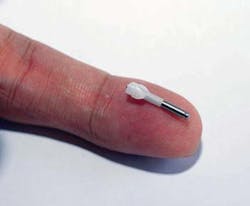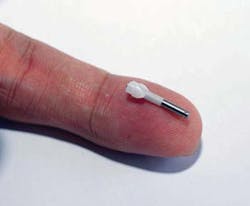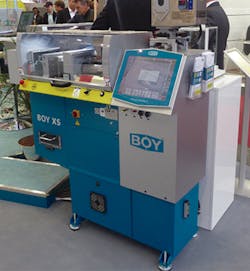Special Report: Laboratory injection molding equipment runs gamut
Those in the market say business is booming for laboratory injection molding equipment.
Customers are seeking equipment qualities such as precision, reportability, temperature regulation and energy efficiency, among other factors. They require that the machines be compact and suited for making small batches. With a more diverse range of polymers now available, customers also are facing new challenges.
Mini-Jector
One injection molding machine line for laboratories is the Mini-Jector Model 55, which is sold by Miniature Plastic Molding (MPM) Ltd., in Solon, Ohio.
"We have pretty much … what I would call the [only] industrial-grade, benchtop reciprocating screw-type machine in the marketplace," said MPM President Bill Frissell.
Three versions of the Model 55 for lab applications are available. One is a basic machine, Model 55, with temperature controllers and relay logic. But the other two are both PC controlled, with one being hydraulic and the other servo-electric.
The servo-electric version, Model 55E-PLC, fits a medical lab that requires equipment that has traceability and high-precision, such as being within 0.001 gram in repeatability.
Model 55P-PLC is the PC-controlled hydraulic machine with hydraulic valve speed control, proportional valve pressure control and linear potentiometer shot-size control, among other features.
Because the benchtop model has a reciprocating screw, it can more closely duplicate the performance of bigger machines. "The technology is essentially the same, it's just a smaller version," Frissell said.
The company also offers a reduced volume screw in the Model 55's 1- and 2-ounce shot-size versions, which are popular because they require little material. "Sometimes when they're mixing these exotic polymers, it's pretty expensive," he said. "So they can get some really good cost savings by the fact that they can get their samples and only have made up a couple of ounces of the compound."
Recently, the company switched from using its own temperature controller algorithm to a more sophisticated version from Mitsubishi Electric Automation.
Frissell said the Mini-Jectors provide energy efficiency advantages. Inquiries for the units are on the increase. "We've never been busier," he said.
Babyplast
The Babyplast line is produced and distributed by Rambaldi & Co. I.T. Srl in Molteno, Italy. The company has seen an increase in inquiries for laboratory machines in the past two to three years for both pre-processing and full production, said Martin Carolan, export sales manager with Rambaldi. That has prompted Rambaldi to introduce a special stainless-steel version of the Babyplast 610P machine line, aimed specifically at laboratories and medical applications where painted parts are often not acceptable. Also, because Babyplast equipment can process all thermoplastic materials with temperatures up to 788 degrees Fahrenheit, it is ideal for producing small parts for medical applications. The company's machines are used in clean-room applications. The machines are distributed by ALBA Enterprises LLC, Rancho Cucamonga, Calif.
Typical applications for the Babyplast machines, Carolan said, are the small screws for fixing various objects and implants to bone. The screws are made of various materials such as PEEK or polylactic acid.
Precision is key, and the shot sizes often are too small for traditional machines because of the difficult materials.
Carolan said the company also has seen an increase in applications using liquid silicone rubber (LSR) materials. Because of this, Rambaldi has increased its range of options available for LSR customers to include various sizes of metering units to complement its pre-mixed 0.5-liter system. That allows customers to use the machines for full production with bigger shot sizes, which makes continuous production possible.
The experience with LSR allowed the company to enter the field of hot-melt applications. The machine Rambaldi offers for hot melt has a special injection unit that facilitates the injection of the material at very low pressure and temperature. It has been used in medical, as well as electronic, applications, Carolan said.
"For Babyplast, medical and lab applications are still quite a small, but very important, niche in the market overall [that] is steadily growing and diversifying," he said. "The expectations and requests from such markets are often quite tough to meet or fulfill but fortunately, we have a very flexible and lean organization and so are able to respond quite quickly and successfully to such new challenges."
Boy Machines
Boy Machines Inc., Exton, Pa., and its sister company, Dr. Boy GmbH & Co. KG, Neustadt-Fernthal, Germany, markets several injection molding machines for the laboratory sector. The company offers the Boy XS, a machine with about 11 tons of clamping force, as well as the Boy 25E and the Boy 35E, said Wolfgang Schmidt, export manager for Boy Machines. He estimated 80 percent of the labs using Boy Machines have those machines, while the remaining 20 percent go for bigger units, such as the Boy 60 and the Boy 100. The machine numbers represent metric tons of clamping force.
"Mostly, those customers like machines which are very compact, because those machines are not installed in a production field, so they don't hold much space, and usually they have just limited materials," Schmidt said. "They don't have to produce many parts, so they are using ... single-cavity or maybe two-cavity smaller molds, and these will be done usually on smaller machines."
Schmidt said laboratory customers look for machines that are reliable and precise for accuracy in comparing different materials. They need to have a qualified reporting system generated in the machine to measure the test. "That's quite easy on our machines."
Boy Machines recently came out with an Econplast version of its machines. It reduces energy consumption up to 40 percent during heating, uses 60 percent less energy during dosing and has faster and more precise temperature regulation. The unit, which is heated via external energy, creates less friction. The Econplast units provide advantages with materials such as glass-fiber-loaded or carbon-fiber-loaded material, Schmidt said.
Another offering Boy Machines introduced last year was an 8mm reciprocating screw plasticizing unit. Schmidt said it has a low shot rate and requires few shots to produce data in lab tests. "If a material maker is developing new materials, they have just a little bit of material. For them, every [bit] matters. Because to produce prototype material, it's very costly."
Over the last three to five years, he said, Boy Machines has gotten increasing numbers of inquiries from labs and universities around the world, beyond its traditional markets of the U.S. and Europe. Manufacturers in Central America, South America and Southeast Asia in particular are now using higher quality materials.
Laboratories like to get an industry machine rather than a typical laboratory machine, Schmidt said, so they can compare their settings to what the customers are doing on their machines. "If you have a laboratory machine you probably have different parameters or measurements. They would like to have a qualified industry machine which delivers also [a] qualified reporting system. So that's a quite good market for us, because we can deliver both."
Allan Gerlat, correspondent
Contact:
ALBA Enterprises LLC, 909-941-0600, http://albaent.com
Boy Machines Inc., 610-363-9121, http://boymachines.com
Miniature Plastic Molding Ltd., 440-542-1166, www.minijector.com


